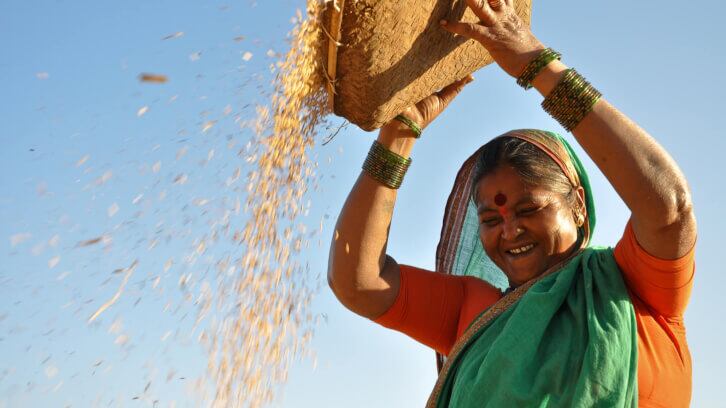In an effort to meet the demands of a rapidly growing population, the need for increased food and feed production has led to higher levels of agri-food waste. Conventional food waste disposal methods, such as landfilling and combustion, pose significant economic and environmental challenges.
Food waste contributes to an estimated 3.3 billion tonnes of CO2 emissions annually, and improper disposal methods have caused environmental issues such as air and water pollution, posing health risks and degrading ecosystems. In response, experts have called for the development of novel approaches to waste management.
Among the proposed solutions, insects have emerged as efficient agents for bio-refining waste. Agri-food waste is increasingly being recognised as a valuable resource for various products, including nutraceuticals, antioxidants, bio-polymers and antibiotics. Recent studies have revealed that insects fed with organic residual streams, such as food by-products and waste, can produce biomass rich in valuable proteins, fats, vitamins and minerals.
Insects play a crucial role in the bio-conversion of organic waste into organic fertilisers, reducing the need for landfilling and enabling the return of essential nutrients to agricultural lands. For instance, insect frass, the excrement of herbivorous insects, helps plants produce their own defences, including insecticidal enzymes, alkaloids, and anti-fungal metabolites that aid in pathogen and disease resistance. Frass fertilisers derived from edible insects have shown promise as alternatives to existing commercial fertilisers, contributing to improved fertility, yield, and nutritional quality of various crops.
However, challenges persist in achieving optimal outcomes and maximising the positive results of insect-based bio-refinery systems. The successful incorporation of insects as sustainable protein sources for animal feed requires collaboration among various stakeholders, including the academic sector, regulatory agencies, waste management organisations, insect and livestock producers, and consumers.
One area of focus lies in the microbial symbionts associated with insects, which play a critical role in their development, fitness, and versatility. The utilisation of insects and their microbial symbionts may offer a promising avenue for transforming waste into valuable resources, while simultaneously mitigating the negative impact on public health and the environment.
The bio-refinery potential of insect microbiota
Insect gut microbiota may have the potential to eliminate pathogens, toxins and pollutants. Recent research has focused on the link between agri-food waste-utilising insects and their associated microbiota, as well as microbe-mediated approaches to organic waste bio-conversion. This research has demonstrated the wide-ranging potential of insect-based bio-refinery systems.
Among the agri-food waste-utilising insects, the black soldier fly has shown exceptional potential as a biowaste converter. Its antimicrobial activity has been studied extensively, with promising results in reducing the concentration of pathogenic microbes in dairy manure and poultry manure and even human faeces.
The diverse microbial and enzymatic activities in the black soldier fly’s digestive system make it highly efficient in breaking down organic materials in food waste. Additionally, its gut bacteria produces enzymes that facilitate the hydrolysis of proteins, lipids, cellulose and starch, contributing to waste bio-degradation.
Several studies have found that the presence of fly larvae aided the waste bio-degradation process by helping to remove or break down a variety of antibiotics and other drugs during composting. The half-lives of these substances were significantly reduced and no bioaccumulation occurred within the larvae, suggesting that the degradation was linked to microbiological activity facilitated by the insect gut.
Insect microbiota has also shown the potential to break down mycotoxins, another group of hazardous compounds found in agri-food waste. For example, mealworm larvae have been found found to feed on wheat grains contaminated by Fusariuam (a genus of filamentous fungi) without experiencing increased mortality, indicating their ability to tolerate or metabolise mycotoxins produced by Fusarium. Similarly, black soldier fly larvae and yellow mealworms have shown high tolerance and no accumulation of mycotoxins and pesticides when fed on corn substrates and poultry feed contaminated by these hazardous compounds.
Challenges and future considerations
According to a review by researchers from Egypt and South Korea, the economics of insect production have received little attention, requiring further research to determine the profitability of insect farms.
Despite researchers having proposed strategies to target the insect gut microbiome — including probiotic inoculation with bacteria to enhance organic waste bio-conversion — these studies have focused mostly on bacteria. The review stated that there should be wider exploration of the insect gut microbiome to facilitate the use of edible insects in sustainable agricultural practices.
While insect-based waste management shows promise for sustainable agriculture and effective waste utilisation, collaboration among multiple stakeholders, further agronomic studies, a better understanding of insect species' potential, economic viability, and continued research on the insect gut microbiome are crucial to fully harness the benefits of this approach. With further research and development, insect-based bio-refineries could hold the key to a more sustainable and efficient future in waste management and agri-food production.
Source: Environmental Science and Ecotechnology
“Insect-based agri-food waste valorization: Agricultural applications and roles of insect gut microbiota”
https://doi.org/10.1016/j.ese.2023.100287
Authors: Mohamed Mannaa, et al.




